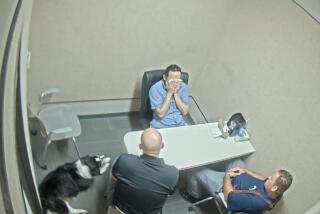An Ordeal Is Over but Not Forgotten : Court: A retarded man’s family sues the county, alleging negligence after deputies freed him to roam for four days along California 126.
- Share via
Eric Schimmel does not talk about it much, but his mother is still mad--mad enough to sue, mad enough to cry when she talks about what happened to her mentally retarded son.
One August night in 1991, Schimmel--who was 19 but has the mental capacity of a 5-year-old--was released from the Ventura County Jail after a petty theft arrest and left to find his own way home to his family 80 miles away in Frazier Park, near the Kern County border.
He wandered for four days before sheriff’s deputies stumbled across him in Fillmore, where someone complained that he was loitering.
Now his mother, Linda Smith, has filed a $1.8-million lawsuit against the county, alleging that sheriff’s deputies negligently endangered Schimmel by cutting him loose at midnight without so much as a phone call to his family.
The lawsuit is being argued in Ventura County Superior Court.
There, Judge John J. Hunter ruled in favor of an argument by the county’s lawyer that the law does not require jail staff to notify relatives when inmates are released. The Schimmels’ lawyer has until Jan. 25 to reply.
Although the county denies any wrongdoing in Schimmel’s case, jail deputies quickly began ordering simple intelligence tests of inmates who may be mentally impaired, said Sgt. Gary Cook of the jail staff.
Smith said she is pressing the suit “because of what they did to him and me. . . . It shouldn’t happen to anyone.”
As she sat in the living room of the family’s wood-frame house, her eyes welled with tears as her sons, Eric and 16-year-old Jayson, sat glued to television footage of flooding in Tijuana.
“I ain’t over it at all,” Smith said. “If I have to tell anybody about it, I start crying again.”
Eric Schimmel seems a little embarrassed by the attention he has received, but is otherwise unfazed.
His teachers at a Taft school for retarded adults say he refuses to talk about what he went through and that he has made tremendous progress in his classes.
Schimmel seems more concerned about studying for the written portion of the California drivers exam, getting his hands on one of the new Elvis stamps and talking about his stepfather’s car wreck.
In November, a Cadillac forced the car driven by his stepfather off the road in Frazier Park and onto an embankment, where it rolled over twice, leaving Schimmel and stepfather Jeff Smith hanging upside down from their seat belts. Smith sustained minor injuries, and Schimmel was unhurt.
“Like a roller coaster. . . . Scary,” Schimmel said with a broad smile. “All I saw was dirt. I remember the car going around in a circle.”
Ask him about what happened after the jail deputies released him Aug. 9, 1991, and he just shrugs and grins.
Schimmel’s parents say they sold the rights to Schimmel’s story to Paramount Pictures, which is considering making a movie about his ordeal.
To Linda and Jeff Smith, it is a trade-off--sacrificing some of his privacy in the hope that his story will prevent someone else from suffering the same ordeal.
“Anything could have happened, that’s the thing,” Jeff Smith said. “It’s something that shouldn’t happen. . . . This’ll be something to open the public’s eyes and let them know what happened.”
What happened is this:
On Aug. 7, 1991, Schimmel climbed into a vacationing neighbor’s van where he had seen Tonka trucks and other toys, prompting someone to summon the Sheriff’s Department to the tiny rural neighborhood just south of Frazier Park.
Deputies arrested the young man and told Linda Smith that they would book him on suspicion of loitering, vehicle tampering and petty theft.
Smith said she did not object because she was angry at her son for not heeding her repeated orders to stay off the neighbor’s property. Maybe a night in a juvenile facility would teach him a lesson, she reasoned.
Instead, he was booked into the Ventura County Jail to await arraignment.
On Aug. 9, his parents learned the arraignment had been delayed until the following week and they went home, expecting to see him in court.
Instead, jail personnel released Schimmel with 14 other inmates seven hours later, at 11:56 p.m., leaving him on his own.
“We didn’t know they let people out of there at all hours of the night,” Linda Smith said.
He headed home in the dark.
Schimmel was familiar with California 126 from family trips to Ventura, so he followed the side of the highway, reading road signs to make sure he was heading in the right direction.
It was a two-day walk to Fillmore, with nothing to eat or drink along the way, he told his mother. Once there, he got lost.
He stayed outside a Von’s supermarket there and slept in a nearby vacant parking lot.
There, store clerk Manuel Beltran spotted him pacing in circles outside the market. He took Schimmel home, offering to feed him and call for help, but the young man turned down the meals and asked to return to the market. Beltran found Schimmel outside the market again later and stuffed $10 and his phone number into Schimmel’s pocket.
By this time, Linda and Jeff Smith had found out Eric had been released and began searching Ventura’s suburbs and transient haunts, handing out flyers with their son’s photograph and a description of the clothes he was wearing when he was arrested.
But it was not until Aug. 13, when deputies were summoned to the supermarket on a report of a suspicious person, that they found the young man in the photograph.
He was taken to the Fillmore sheriff’s station, where he and his mother collapsed in a tearful embrace, Schimmel asking, “Mommy, are you mad at me?”
Once word got out about his ordeal, movie company executives bombarded his parents with calls.
“We talked to people from Turner Broadcasting, Warner, Paramount. I’m, like ‘ No, this isn’t happening,’ ” Linda Smith said. “That phone was not shutting up. You’d hang it up and it’d ring again, hang it up and it’d ring again.”
They finally handed the matter over to their lawyer, who also was working on a deal with Ventura County prosecutors that would allow Schimmel to receive special education instead of criminal punishment for the charges stemming from his arrest.
Ventura County authorities agreed to pay for Schimmel to attend classes in Taft, where he is learning how to detail cars, use computers and communicate more effectively.
It is a 65-mile, 70-minute drive through desolate oil fields and agricultural plains to reach the school, but Schimmel’s parents say they have been coping with the task pretty well since he enrolled last March.
“I usually put a CD in the radio so I can crank it up,” said Linda Smith, glad that her son seems to be flourishing there.
“Those teachers are something else. They like him over there a lot,” she said.
“Eric’s got potential,” said Sandy Popejoy, one of his instructors. “He reads, and the social interaction and communication skills he’s learning now are really going to make his life easy.”
“I remember when he first came here, he wouldn’t talk to anybody,” said one of Schimmel’s classmates. “He’s gotten over his shyness.”
Beltran, 23, the good Samaritan who took Schimmel in, said his involvement with the young man changed his life for a while.
He received 150 letters from people praising his actions, thanks and congratulations from the city of Fillmore and the Board of Supervisors, and a $1,000 scholarship from the Assn. of Retarded Citizens of Ventura County--money he hopes will help him train to be a medical technician.
Told that Schimmel is doing well in school, Beltran said, “It’s great to hear that. . . . I’m very happy to hear about him.”
In class last week, Schimmel sipped a soda, laughing easily and jumping into a round-table discussion that his teachers led on whether Taft should be allowed to have a casino.
“Yeah!” he would say, agreeing with someone who explained their view, then shout “NOT!” at someone with whom he disagreed, always delivering the word with a cheerful grin.
“What about Eric? Eric said no. Why don’t you think there should be casinos here?” Popejoy asked.
“It’ll bring crime,” he replied. “Violence. Drugs.”
“What other reasons?” she asked.
“Graffiti,” Schimmel answered.
“OK,” Popejoy said, tallying the votes. “Our vote is no.”
“Yes!” Schimmel whispered, his hands doing a victory drum roll on the table.
More to Read
Sign up for Essential California
The most important California stories and recommendations in your inbox every morning.
You may occasionally receive promotional content from the Los Angeles Times.










